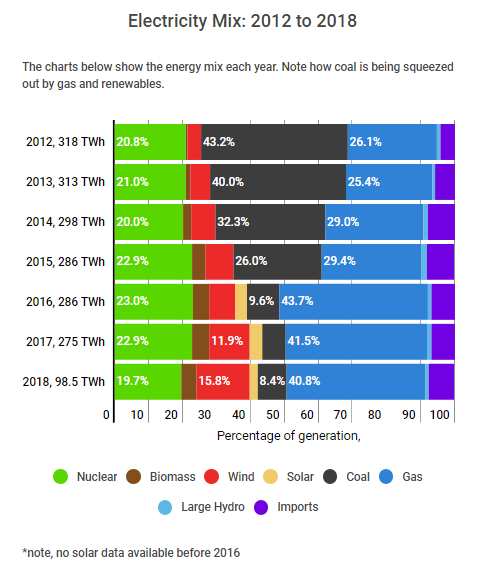In 2017, Britain’s reduction in coal use was commended around the world. Over the year, just 6.3% of UK electricity was produced from its coal power stations which is remarkable when you consider that coal provided more than 40% of electricity in 2012. Through MyGridGB, I’ve tracked how there were over 620 hours of coal free electricity over the year and there is no doubt that this fall in coal use represents a watershed moment in Britain’s changing energy system. However, the headlines mask an unfortunate truth which is bad news for energy security, energy prices and potentially climate change.
The challenge is that British coal is not just being substituted by renewable electricity- it is also being replaced by gas. This often overlooked fossil fuel pervades most of our energy system and it now provides 40% of our electricity and nearly all of our domestic heating needs and as a country we consume nearly eight times more gas than coal.

Reducing dependence on coal – squeezed out by gas and low carbon generation as of 23rd April 2018.
Recent history shows us that dependance on a limited number of energy sources risks supply security. In March 2018, National Grid issued a gas supply warning saying that there was a real risk of shortages and as a result coal use was 260% higher than in March 2017. Similarly, in 2017 British coal plants were used to generate electricity for France (which is over 80% dependant on nuclear power) after power station failures over the channel.
In 2025, Britain will have switched off or decommissioned its coal power stations. If there there is a major geopolitical crisis and gas supplies are reduced globally then Britain is in trouble. Although Britain imports most of its gas from Norway, it is still vulnerable to the whims of the international gas market. With no coal plants to fall back on, the country faces a choice- high electricity prices, high prices of importing electricity from abroad or shortages.
Furthermore, burning gas is not good for the climate: it is cleaner than coal but it is nowhere near clean enough to meet our climate targets. Switching from coal to gas in the name of climate is like a criminal switching from being a bank robber to being a shoplifter – they’re still breaking the law and one day they will get caught!
Switching off coal reduces our ability to play international energy markets and still leads us to miss climate targets. At the same time, it takes our attention away from factors which really can improve our energy supply and our reliance on gas might encourage our policymakers to push even harder for fracking in the UK – rather than investing in low carbon alternatives.
Britain is not reaping the rewards of the investment paid in building a strong renewables industry because the Government put the brakes on it. Recent cuts to subsidies for renewable technologies were disastrous- causing tens of thousands of job losses and investment in solar falling by 75%. If Britain is to meet climate change targets, it now needs to reinvest in those low carbon alternatives.
There is another way
Solar and storage is now an economically viable solution for homes and I have seen homes which halve their carbon emissions using solar and battery storage. However, installing solar in all new homes and businesses has yet to be included in building regulations despite strong public support and huge economic benefits. This needs to change this immediately because every new home, shop and industrial roof built without solar is a missed opportunity.
Similarly, demand reduction through efficiency savings in appliances and heating our homes must increase. Total electricity production has fallen by nearly 13% in the past 10 years – with as big an impact on climate as the coal switch off so lauded by our policy makers. More can be done and we must look to structure our energy markets with commercial incentives for suppliers to actually reduce our energy consumption.
Lastly the world has seen record low prices for wind and solar. 2017 auctions for offshore wind in the UK made a mockery of the strike price of Hinkley C which is around 50% higher per MWh than offshore wind or 70% higher than solar and storage investments today.
Britain cannot ignore the advances in technology that can win our battle for cleaner, more secure and cheaper energy. A balanced energy policy encourages continued investment in technologies that reduce the dependence on foreign supplies and international price shocks. That keeps bills low and energy security high. I’ve seen through MyGridGB how people yearn to be independent and own their energy again. Simple policy changes to reduce demand and reinvigorate local energy production are not the false dawn of the coal switch-off. They can be the start of British people owning their own energy supplies again.
Note: coal free refers to coal generation in Britain not that from imported from Europe via interconnectors
